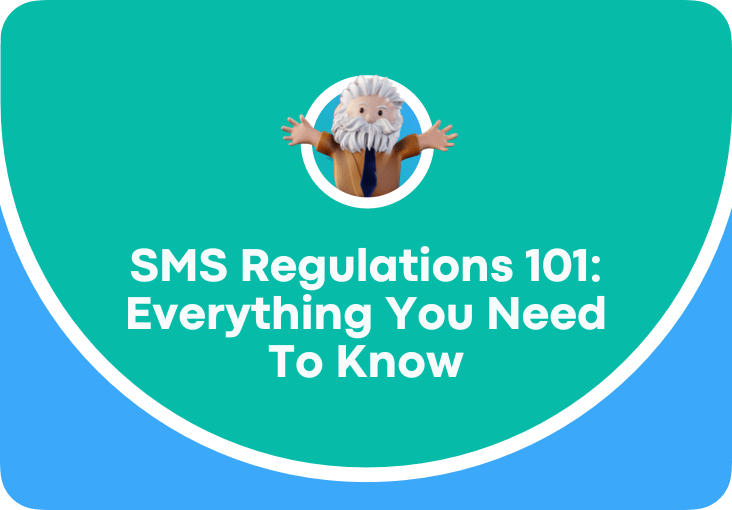SMS Regulations 101: Everything You Need To Know

Although compliance regulations for SMS aren’t a new phenomenon, their scope has expanded over the past decade due to advances in technology and legislative changes.
Because SMS communications are one of the most direct ways for businesses to contact customers, regulations are in place to protect against unwanted messages.
Ultimately, SMS regulations ensure that customers control the messages they receive.
Regulations for SMS vary depending on the global region, and each country has its own national laws.
Failure to comply with these regulations has real consequences, including the possibility of being blacklisted.
But following regulations for each country will protect against situations like this and allow you to ethically and effectively market to consumers.
To help you better understand SMS regulations, we’ve compiled a list of everything you need to know. You’ll find regional regulations for the US, UK, and EU, along with insight into how each country expands on these laws.
SMS Regulations in the US
All SMS messaging in the US is governed by the Cellular Telecommunications and Internet Association (CITA) and the CAN-SPAM Act.
These governing bodies have strict electronic communications regulations that are important to adhere to when sending an SMS marketing message to mobile users in the US.
These regulations include:
- Businesses must have explicit consent from consumers before sending marketing text messages to them
- Businesses must make it clear to subscribers that they’re signing up to receive recurring automated text messages
- Sending unwanted commercial text messages (robotext) to mobile devices is illegal
- Opt-in information must be visible and close to the call to action (CTA)
- Companies must provide clear information that easily allows consumers to unsubscribe to the messages at any time (this applies to advertisements and not to any messages relating to an existing transaction or relationship)
You can view more in-depth information on SMS regulations in the US.
SMS regulations in the EU
The European Union (EU) has some of the world’s strictest privacy and security regulations. General Data Protection Regulation (GDPR) controls these regulations.
GDPR obligations apply to any organisation that collects, targets or processes data related to EU citizens, no matter where their organisation is located. SMS regulations in the EU include:
- Consumers must explicitly opt-in to receive marketing communication
- Information about what the individual is signing up for must be readily available and unambiguous
- All marketing messages sent via SMS must include a simple and free opt-out method (opting out must be as straightforward as opting in)
- Under GDPR, organisations can only use the data they collect for the purposes specified during the opt-in stage
- Brands are accountable for the security of the customer data they store and must take measures to protect it (eg. investing in a tech stack, training employees to handle data safely)
Find more information about EU SMS regulations.
SMS regulations in the UK
In the UK, several organisations and regulations influence SMS compliance laws, including the General Data Protection Regulation (GDPR) and the Data Protection Act (DPA).
Like the EU, the UK has fully adopted GDPR, with Brexit having no bearing on its implementation in the UK
UK SMS regulations include:
- Recipients must give express written consent to receive SMS
- When collecting consent, brands must also include relevant links to the Privacy Policy and Terms of Service that disclose what parties can access their data
- All opt-in language must convey what the subscriber is signing up for
- If a recipient chooses to opt out of messaging, companies are obligated to process it promptly
- Businesses must share their identity when sending SMS messages to their customers
- Brands cannot send SMS marketing messages after 8:00 pm or before 9:00 am, also known as “the quiet hours.”
Take a deeper look at UK SMS regulations.
SMS regulations by country
SMS regulations can be broken down further, with every country having specific SMS compliance laws. These laws revolve around factors including:
Sender ID
Sender IDs can be critical to the success of your SMS campaigns, allowing customers to identify your brand. However, every country has sender ID regulations with which you must comply.
For example, some countries require caller IDs to be preregistered with the country’s carriers, while others do not. Messages may not be delivered if the sender ID is not preregistered in those locations that require it.
Opt-out
Opt-out rules for SMS are generally the same in most countries. If a customer opts out, you must immediately cease contact with them.
However, there are some expectations for this, with certain countries, including France and the US, requiring you to reply to an opt-out message to confirm to customers it has been received.
Message length
In general, a single SMS message supports up to 160 characters. Yet some countries require messages to be slighter shorter than this. For example, Brazil only supports messages under 157 characters.
If an SMS exceeds its supported character limit, it’s often broken into segments and sent individually, before being re-assembled when it reaches its destination.
The downside of this is that you can be charged for two messages. It’s also important to remember that not all carriers support this feature, and the extra characters on the end of your message may be deleted.
Sending time
Text messages are typically viewed as more intrusive than email, so many countries only allow businesses to send texts during waking hours (usually between 8 am and 9 pm)
With automation features, you can arrange all your messaging to comply with a particular country’s “quiet hours” when sending campaigns.
‘Do not contact’ registries
‘Do not contact’ registries exist in many countries to protect people from receiving unwanted marketing materials.
If an individual has signed their country’s ‘do not disturb registry,’ you’re no longer permitted to contact them with promotional messages. If this law is not adhered to, organisations can get hit with suspensions, fines, and more serious legal action.
We hope this guide has helped you expand your understanding of the SMS regulations that exist in various regions around the globe.
Overall, we now know that when you choose to use text messages as part of your marketing initiatives, you must comply with all local and national regulations in those locations.
Take the stress out of SMS regulations!
If you’re looking for a solution that allows you to send marketing text messages to countries around the globe while consistently adhering to specific SMS regulations based on location, Grambell can help.
With Grambell’s SMS API automation, you can write, plan, and schedule your SMS campaigns to be delivered to subscribers at the right time no matter where they are located.
Grambell not only helps you send and receive SMS text messages 24/7 but reduces messaging fees, boost customer engagement, and increases conversions without any coding.



